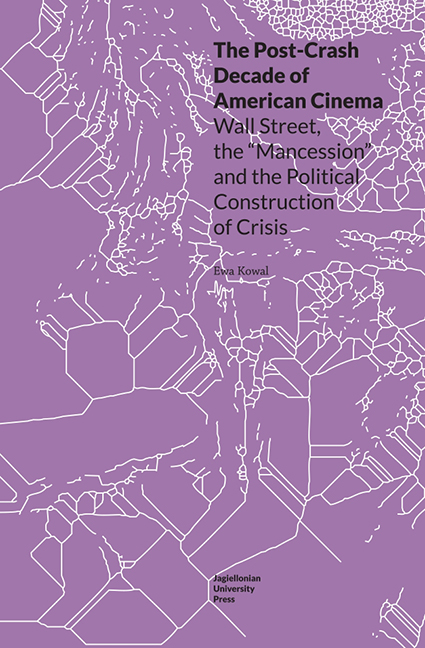 The Post-Crash Decade of American Cinema
The Post-Crash Decade of American Cinema Published online by Cambridge University Press: 05 May 2023
Michael Moore's 2009 documentary Capitalism: A Love Story opens with a vintage cinema warning, used only somewhat ironically: “This picture, truly one of the most unusual ever filmed, contains scenes which under no circumstances should be viewed by anyone with a heart condition or anyone who is easily upset.” After a montage of CCTV footage of bank robberies in the US is displayed during the opening credits, the first scene contains another vintage quotation about a much older subject matter. It is an excerpt from Encyclopaedia Britannica Films’ TV programme titled “Life in Ancient Rome.” While the narrator sums up life in ancient Rome, Moore juxtaposes images from the bygone empire with their equivalents in the contemporary United States of America:
Rome was the largest and the most beautiful city of the ancient world. The magnificent façade of the empire, however, could not conceal the seeds of decay, the unhealthy dependence of the economy on slaves, the disparity between rich and poor. Behind the splendor of the Forum were vast areas of crowded slums. Escape from the slums was difficult, for there were few jobs available and practically none for the unskilled. To keep idle citizens entertained and out of mischief, frequent games and spectacles were held at public expense. At first, only chariot races were sponsored. But by the reign of Trajan, brutal combat to the death had become popular. Earlier in Rome's history, elected representatives exercised the power. But by now, every function of government had been absorbed by the emperor who was above the law and ruled by decree. That a people as civilized as the Romans, with the most humane system of law ever devised, could tolerate the violation of human beings is astonishing. This imbalance and the irresponsible behaviour of public officials would become major reasons for Rome's eventual decline.
In no uncertain terms, Moore establishes an analogy between the ancient and fallen Roman Empire and (in his view) the falling American Empire.
Similarly, only a year after the financial crisis, the BBC released its TV depiction of The Last Days of Lehman Brothers.
To save this book to your Kindle, first ensure [email protected] is added to your Approved Personal Document E-mail List under your Personal Document Settings on the Manage Your Content and Devices page of your Amazon account. Then enter the ‘name’ part of your Kindle email address below. Find out more about saving to your Kindle.
Note you can select to save to either the @free.kindle.com or @kindle.com variations. ‘@free.kindle.com’ emails are free but can only be saved to your device when it is connected to wi-fi. ‘@kindle.com’ emails can be delivered even when you are not connected to wi-fi, but note that service fees apply.
Find out more about the Kindle Personal Document Service.
To save content items to your account, please confirm that you agree to abide by our usage policies. If this is the first time you use this feature, you will be asked to authorise Cambridge Core to connect with your account. Find out more about saving content to Dropbox.
To save content items to your account, please confirm that you agree to abide by our usage policies. If this is the first time you use this feature, you will be asked to authorise Cambridge Core to connect with your account. Find out more about saving content to Google Drive.